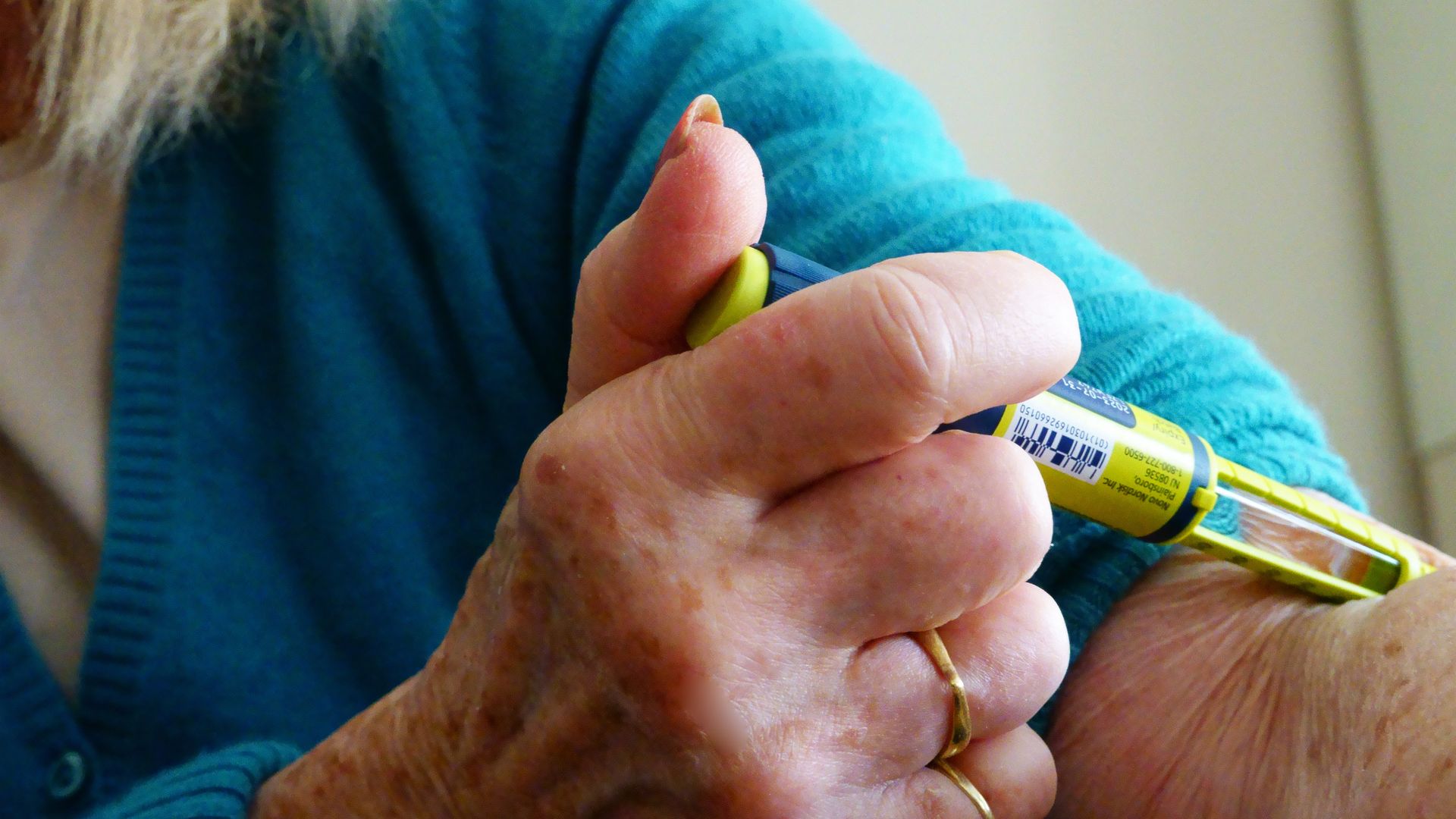Plus, a state-by-state look at long COVID | Thursday, June 23, 2022
| | | | | | | Presented By PhRMA | | | | Axios Vitals | | By Tina Reed · Jun 23, 2022 | | Good morning, Vitals readers. Today's newsletter is 899 words or a 3-minute read. 💉In non-COVID vaccine news: A CDC advisory panel voted to recommend seniors 65 and older get a newer, "souped-up" version of the flu vaccine since the regular shots don't provide enough protection, ABC News reports. | | | | | | 1 big thing: FDA could get tough on Juul |  | | | Illustration: Sarah Grillo/Axios | | | | The Food and Drug Administration is poised to sweep Juul e-cigarette products off store shelves, the Wall Street Journal reported on Wednesday, in what could be a major turning point for an agency that's taken a sluggish, at times disjointed approach to regulating the vaping industry, Axios' Arielle Dreher writes. Why it matters: The move, coming amid a push to cap nicotine in cigarettes, may signal the Biden administration is ready to try to put tobacco use behind us. Where it stands: The FDA is ready to deny Juul a marketing order for its menthol and tobacco-flavored products after a two-year review that weighed the products' benefits for adult smokers against risks to teens, the WSJ reported, citing people familiar with the matter. - Juul has been in regulatory limbo for several years, even while its market share swelled, driven in part by flavored products popular among teens.
What they're saying: The FDA wouldn't confirm or deny the WSJ report or provide a status on its Juul deliberations. - Juul did not respond to emailed request for comment.
- Groups that oppose youth smoking say taking the company off the market would mark a dramatic step to discourage youth smoking.
- "This is a most-welcomed and a long-overdue decision," Erika Sward, assistant vice president of advocacy for the American Lung Association, told Axios.
The other side: The e-cigarette industry is worried regulators will take a carte blanche approach to policing its products. - "FDA's staggering indifference to ordinary Americans and their right to switch to the vastly safer alternative of vaping will surely rank as one of the greatest episodes of regulatory malpractice in American history," American Vapor Manufacturers Association President Amanda Wheeler said in a statement.
Go deeper. |     | | | | | | 2. Proposed insulin cost cap poses test for Dems |  | | | Photo: Joan Slatkin/UCG/Universal Images Group via Getty Images | | | | A Senate deal to cap the cost of insulin at $35 a month for individuals with private insurance and Medicare poses a new test of whether Democrats can make good on campaign pledges to rein in drug costs, Axios' Adriel Bettelheim writes. Why it matters: With most of President Biden's health agenda still stalled in Congress, the plan unveiled on Wednesday could be a politically appealing way to limit out-of-pocket costs for more than 37 million Americans with diabetes. Yes, but: The legislation from Sens. Jeanne Shaheen (D-N.H.) and Susan Collins (R-Maine) needs the backing of every Democratic senator and 10 of the chamber's Republicans, who've been critical of drug price caps. - The plan also doesn't guarantee lower list prices for insulin and could instead shift more of the cost to payers, resulting in higher premiums.
- A spokesperson for America's Health Insurance Plans says the draft raises serious concerns and raised the prospect it could "undermine successful, competitive private-market solutions."
What we're watching: Shaheen and Collins are likely to modify their proposal to make it more appealing on cost and other grounds. Read the rest. |     | | | | | | 3. Women less likely to get research credit | | Female scientists are less likely to be cited for their work in journal articles than their male peers, according to a study published in the journal Nature. Why it matters: There is already a "well-documented gap" in published research between male and female researchers which only worsened during the pandemic. - But this study from Ohio State University researchers shows part of this gap isn't just due to productivity differences, but instead due to women's contributions not being acknowledged.
Details: The researchers used the UMETRICS dataset available through the Institute for Research on Innovation and Science, which contained detailed information on sponsored research projects for 52 colleges and universities from 2013 to 2016. - Women who worked on a research project were 13% less likely to be named as authors in related publications compared to their male colleagues.
- Women were 59% less likely than men to be credited on patents related to projects that they both worked on.
- The trend held true across all scientific fields, the researchers said.
|     | | | | | | A message from PhRMA | | Voters want Congress to address health insurance | | |  | | | | Many Americans reject so-called government "negotiation" once they learn it could sacrifice access, choice and innovation. The story: Respondents find health care coverage costs unreasonable and a top priority health care issue for policymakers to address today. Read more in the new survey. | | | | | | 4. 1 in 5 COVID sufferers report long COVID symptoms |  Data: Household Pulse Survey; Map: Jared Whalen/Axios Kentucky, Alabama, Tennessee and South Dakota have the highest percentage of adults who report having long COVID symptoms, according to data from the CDC's Household Pulse Survey. - Hawaii, Maryland, and Virginia had the lowest percentage experiencing symptoms.
Why it matters: The data, collected June 1–June 13 by the U.S. Census Bureau, also offers a stark picture of who is suffering from long-term aftereffects following a COVID-19 infection. The big picture: Overall, one in five adults who report they've had COVID say they are experiencing long COVID symptoms. - Older adults are less likely to have it: Nearly three times as many adults ages 50- to 59-years-old said they currently have long COVID compared to those 80 years old and older.
- It's more common in Hispanic and white adults. Nearly 9% of Hispanic adults and 7.5% of non-Hispanic white adults were more likely to say they currently have long COVID. About 7% of Black adults and 3.7% of Asian adults report having it.
- It's more common in bisexual and transgender adults compared to adults of other sexual orientations and gender identities.
|     | | | | | | 5. Catch up quick | | 👉 Britain's polio-free status may be in jeopardy for the first time in nearly 20 years as several samples of the polio virus were found during recent London sewage testing. (Axios) 🧪 The U.S. will expand its monkeypox testing at commercial labs as the outbreak of the infectious disease grows. (Axios) 👀 Speculation has been swirling around whether American Indian tribes might offer abortion services on Native land within states that may soon outlaw abortion. Tribes are showing little interest in that idea. (KHN) |     | | | | | | A message from PhRMA | | Out-of-pocket costs create significant barriers to care | | |  | | | | New data show that 35% of insured Americans spent more on out-of-pocket costs than they could afford in the past month. The story: Many patients are experiencing an insurance system that isn't working for those who need care. Learn how insurance is leaving patients exposed to deepening inequities. | | |  | It's called Smart Brevity®. Over 200 orgs use it — in a tool called Axios HQ — to drive productivity with clearer workplace communications. | | | | | | Axios thanks our partners for supporting our newsletters. If you're interested in advertising, learn more here.
Sponsorship has no influence on editorial content. Axios, 3100 Clarendon Blvd, Suite 1300, Arlington VA 22201 | | | You received this email because you signed up for newsletters from Axios.
Change your preferences or unsubscribe here. | | | Was this email forwarded to you?
Sign up now to get Axios in your inbox. | | | | Follow Axios on social media:    | | | | | |
No comments